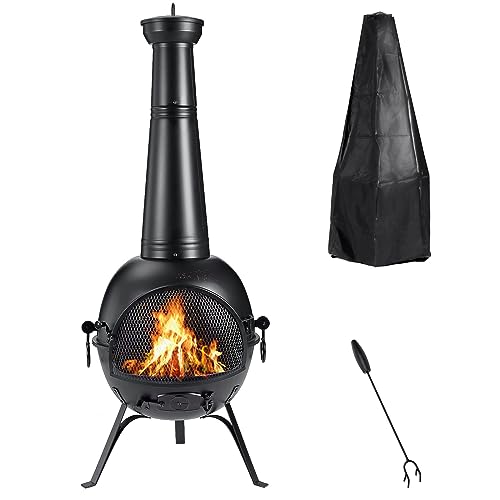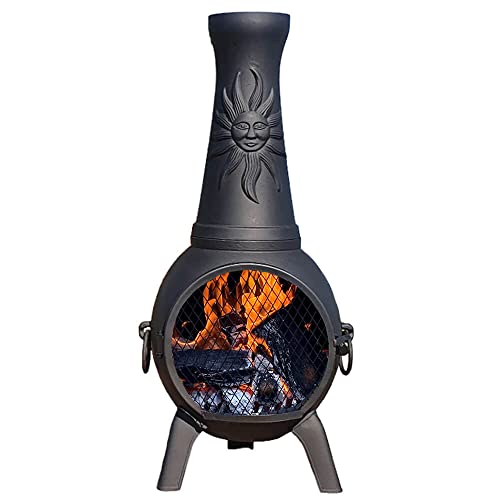5 Killer Quora Answers On Chimineas Sale
페이지 정보

본문
 Things You Should Know Before Buying a Chiminea
Things You Should Know Before Buying a Chiminea Chimineas are a great addition to your backyard. They provide warmth and ambience. However, there are a few things you should know before buying one.
Chimineas are a great addition to your backyard. They provide warmth and ambience. However, there are a few things you should know before buying one.For instance, certain Chimineas release toxic particles into the air. You can prevent this by using eco-friendly fuels like bioethanol fire pits. They also require regular maintenance.
The History of the blue rooster chiminea
Chimineas add warmth and a welcoming lighting to outdoor living areas. They can turn a cold summer evening into a cozy space for entertaining family and friends or simply relaxing. Chimineas were initially made of clay and other materials. They have changed over time to meet different practical and aesthetic requirements.
The most common chimineas are an oval shape and a chimney. However, they are also available in contemporary styles that have a more open design. They usually sit on a base that raises them off the ground and have a large clay chiminea opening for adding firewood. Chimineas can be plain or unpainted, while others feature painted, raised or incised particulars.
The earliest chimineas were made out of fired clay and were intended for cooking and heating. As these structures became more popular, they were modified to meet the needs of different climates. Improvements in design and construction techniques made them more durable. Chimineas are now available in various metals, stones and clays, each with their own aesthetic and practical benefits.
Depending on the kind of chiminea you choose It may require regular maintenance to ensure it is in good condition. For instance clay Chimineas sale are prone to cracking and deterioration over time if they are not properly stored in the winter. To protect them, use a protective sealant that is specifically designed for big clay chiminea and reapply it every 3-6 months to ensure the best protection.
Metal chimineas are more resistant to damage but can still crack if not stored correctly. To prevent this, place them in a secure space that protects them from the elements as well as any potential rain or snowfall. Similarly, make sure that the chiminea is set on a level and stable surface to avoid it falling over. It should not be put under any trees or over any other structures such as a patio roof.
Chimineas are heavy and difficult to move. You can move a small clay chiminea easily across your yard or garden.
Their Functionality
The outdoor fireplaces were initially constructed as cooking vessels for the Mexican tribes who lived in towns. They are ideal for creating a cozy atmosphere. They also function as practical heaters, dispersing heat efficiently through their chimney systems. Their aesthetic versatility permits them to complement a wide range of design styles.
As an added advantage they are also easy to maintain and manage making them less prone to regular cleaning. Moreover, they can last for a long time when properly maintained and protected from extreme weather conditions. However the quality of materials used and the maintenance techniques employed by homeowners will determine their durability.
Chimineas come in different materials like traditional clay, cast iron and steel and all of them offer distinct durability and aesthetics. For instance, the latter are more polished and refined appearance that suits modern designs. They also retain heat exceptionally well, which makes them ideal as outdoor heating. They are also made of environmentally friendly materials and are an alternative to fossil fuels.
The daily impact of chimineas on air quality is contingent on factors such as duration of use, type and moisture content of the wood and the efficiency of the chiminea design. Yet, they emit particles that can be harmful to human health and contribute to air pollution and climate change. This can be mitigated by using dry, seasoned wood and an efficient chiminea.
Chimineas are enclosed structures which reduce the amount of smoke produced. They are also designed to ensure that smoke is directed upwards to minimize potential health risks and nuisances to neighbours. The open design of firepits could result in a significant amount smoke that can affect living areas.
The decision between a chiminea or firepit comes down to the budget, your preferences and the functionality. Both are adaptable and each has a unique aesthetic. Chimineas are an excellent option for those who wish to create a cozy ambience with little effort. Because of their special design they are easier to handle when heated which makes them a viable alternative to outdoor fire pits.
Materials
Chimineas are available in a variety of styles to suit every taste. They typically have the base of a potbelly that tapers to the shape of a chimney. They are made in either clay, metal or cast iron. They are a great addition to any deck or patio in your backyard. They can create warmth and ambiance, while also adding light. This allows you to spend more outdoor chiminea time. Chimineas are a great alternative of fire pits as they are more attractive and are better at directing smoke away from the people around them.
Chimineas made of clay can be made by hand using raw clay from the region. Chimineas are then fired to remove any excess material and create an extremely hard surface that is resistant to water. Then they are coated with a protective glaze that lowers the possibility of cracking or warping. Chiminesas can be stored outdoors all year long, with the exception of bad weather. If it is stored outside must be covered and secured by a chiminea covering to keep the clay from becoming wet.
If it is made of clay or metal, or cast iron, a chiminea will give a stylish, rustic style to your patio. They are designed to withstand extreme temperatures, making them suitable for cooking, and they are available in a variety of sizes. Some come with a removable BBQ grill.
Before purchasing a chiminea, ensure that it is safe to use and has proper ventilation. It is important to place it on a non-combustible surface such as a brick or concrete patio, and it must not be placed on any kind of overhang, such as a roof or pergola. It is essential not to use water to extinguish the flames, because the sudden temperature shift can crack terracotta and clay.
Chimineas can be used outdoors, but in order to maintain outdoor temperatures they should be broken in gradually by starting small fires, and then increasing the size of the fire gradually. To avoid rust and ash accumulation It is recommended to regularly clean your chiminea by using an outdoor wood cleaner.
Environmental Impact
Chimineas add warmth and atmosphere to outdoor spaces, but their use can cause harmful gases. The burning of wood in chimineas releases carbon monoxide which is a deadly gas that has no smell and is colorless, and can cause a variety of health issues like respiratory problems.
This gas is especially dangerous in enclosed structures such as Chimineas, where it can build up to levels that are toxic. It can lead to carbon monoxide poisoning, which can cause unconsciousness or death. It also contributes to air pollution and global heating, which is why chimineas should be kept outdoors and away from any flammable items.
Apart from carbon monoxide, chimineas may emit particulate matter (PM2.5) and other harmful pollutants. The size of the chiminea, as well as the type of fuel used affect the amount of emissions. Dry wood fuels produce less than wet logs. Using a chimney with an arrestor for sparks will reduce smoke and PM2.5 emissions.
Although chimineas have developed over the years, their quintessential design -the pot-belly base and an elongated chimneyremains the same. This harmony between innovation and preservation underscores a reverence for the aesthetics of the past that have led to the chiminea outdoor's popularity across Europe and beyond.
Today's chimineas are available in a variety of styles and materials to match almost any garden style. While clay chimineas continue to be popular, a lot of people prefer metal versions that offer greater durability and weather resistance. They are made of cast iron or cast aluminum, and even stainless steel and can be shaped in a range of designs to suit different preferences.
If you're looking for modern appearance, there are also more linear and slim designs that do not compromise the functionality. It is crucial to keep in mind that a metal chiminea will need more regular maintenance and care than a clay model, since it will be exposed to thermal shock each time you begin to use it.
When choosing a chiminea, it is recommended to read the manufacturer's instructions carefully before igniting a fire. It is also a good idea to purchase a cover for your chiminea when not in use to prevent any water damage or buildup of dust. It is also important to clean your chiminea regularly and get rid of any ash before you begin to build a new fire.
- 이전글What's The Current Job Market For Hobs Uk Professionals? 24.12.09
- 다음글Five Killer Quora Answers To Electric Power Scooters 24.12.09
댓글목록
등록된 댓글이 없습니다.




